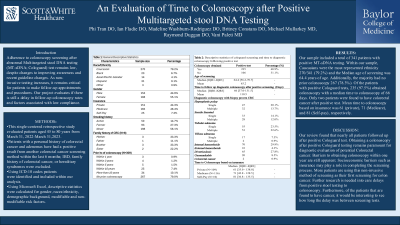Sunday Poster Session
Category: Colorectal Cancer Prevention
P0398 - An Evaluation of Time to Colonoscopy After Positive Multitargeted Stool DNA Testing
Sunday, October 27, 2024
3:30 PM - 7:00 PM ET
Location: Exhibit Hall E


Phi Tran, DO
Baylor Scott & White Medical Center
Temple, TX
Presenting Author(s)
Phi Tran, DO, Collin Telchik, MD, Madeline Washburn-Rodriguez, DO, Britney Constans, DO, Michael Mullarkey, MD, Raymond Duggan, DO, Vani Paleti, MD
Baylor Scott & White Medical Center, Temple, TX
Introduction: Adherence to colonoscopy screening after abnormal Multitargeted stool DNA testing (MT-sDNA; Cologuard) test remains low, despite changes to improving awareness and recent guideline changes. As non-invasive testing increases, it remains critical for patients to make follow-up appointments and procedures. Our project evaluates if there is still a delay in follow-up colonoscopy rates and factors associated with low compliance.
Methods: This single-centered retrospective study evaluated patients aged 45 to 80 years from March 31, 2022-March 31,2023. Patients with a personal history of colorectal cancer and adenomas have had a positive result from another colorectal cancer screening method within the last 6 months; IBD, family history of colorectal cancer, or hereditary syndromes were excluded. Using ICD-10 codes patients were identified and included within our analysis. Using Microsoft Excel, descriptive statistics were calculated for gender, races/ethnicity, demographic background, modifiable and non-modifiable risk factors.
Results: Our sample included a total of 341 patients with positive MT-sDNA testing. Within our sample, Caucasians were the most represented ethnicity 270/341 (79.2%) and the Median age of screening was 64.4 years of age. Additionally, the majority had no prior colonoscopy 267 (78.3%). Of the patients with positive Cologuard tests, 235 (97.5%) obtained colonoscopy with a median time to colonoscopy of 66 days. Only two patients were found to have colorectal cancer after positive test. Mean time to colonoscopy based on insurance was 61 (private), 71 (Medicare), and 81 (Self-pay), respectively.
Discussion: Our review found that nearly all patients followed up after positive Cologuard test. Obtaining a colonoscopy after positive Cologuard testing remains paramount for diagnostic evaluation of potential Colorectal cancer. Barriers to obtaining colonoscopy within one year are still apparent. Socioeconomic barriers such as insurance may play a role in completing the screening process. More patients are using this non-invasive method of screening as their first screening for colon cancer. Further research is needed into care delays from positive stool testing to colonoscopy. Furthermore, of the patients that are found to have cancer, it would be interesting to see how long the delay was between screening tests.
Note: The table for this abstract can be viewed in the ePoster Gallery section of the ACG 2024 ePoster Site or in The American Journal of Gastroenterology's abstract supplement issue, both of which will be available starting October 27, 2024.
Disclosures:
Phi Tran, DO, Collin Telchik, MD, Madeline Washburn-Rodriguez, DO, Britney Constans, DO, Michael Mullarkey, MD, Raymond Duggan, DO, Vani Paleti, MD. P0398 - An Evaluation of Time to Colonoscopy After Positive Multitargeted Stool DNA Testing, ACG 2024 Annual Scientific Meeting Abstracts. Philadelphia, PA: American College of Gastroenterology.
Baylor Scott & White Medical Center, Temple, TX
Introduction: Adherence to colonoscopy screening after abnormal Multitargeted stool DNA testing (MT-sDNA; Cologuard) test remains low, despite changes to improving awareness and recent guideline changes. As non-invasive testing increases, it remains critical for patients to make follow-up appointments and procedures. Our project evaluates if there is still a delay in follow-up colonoscopy rates and factors associated with low compliance.
Methods: This single-centered retrospective study evaluated patients aged 45 to 80 years from March 31, 2022-March 31,2023. Patients with a personal history of colorectal cancer and adenomas have had a positive result from another colorectal cancer screening method within the last 6 months; IBD, family history of colorectal cancer, or hereditary syndromes were excluded. Using ICD-10 codes patients were identified and included within our analysis. Using Microsoft Excel, descriptive statistics were calculated for gender, races/ethnicity, demographic background, modifiable and non-modifiable risk factors.
Results: Our sample included a total of 341 patients with positive MT-sDNA testing. Within our sample, Caucasians were the most represented ethnicity 270/341 (79.2%) and the Median age of screening was 64.4 years of age. Additionally, the majority had no prior colonoscopy 267 (78.3%). Of the patients with positive Cologuard tests, 235 (97.5%) obtained colonoscopy with a median time to colonoscopy of 66 days. Only two patients were found to have colorectal cancer after positive test. Mean time to colonoscopy based on insurance was 61 (private), 71 (Medicare), and 81 (Self-pay), respectively.
Discussion: Our review found that nearly all patients followed up after positive Cologuard test. Obtaining a colonoscopy after positive Cologuard testing remains paramount for diagnostic evaluation of potential Colorectal cancer. Barriers to obtaining colonoscopy within one year are still apparent. Socioeconomic barriers such as insurance may play a role in completing the screening process. More patients are using this non-invasive method of screening as their first screening for colon cancer. Further research is needed into care delays from positive stool testing to colonoscopy. Furthermore, of the patients that are found to have cancer, it would be interesting to see how long the delay was between screening tests.
Note: The table for this abstract can be viewed in the ePoster Gallery section of the ACG 2024 ePoster Site or in The American Journal of Gastroenterology's abstract supplement issue, both of which will be available starting October 27, 2024.
Disclosures:
Phi Tran indicated no relevant financial relationships.
Collin Telchik indicated no relevant financial relationships.
Madeline Washburn-Rodriguez indicated no relevant financial relationships.
Britney Constans indicated no relevant financial relationships.
Michael Mullarkey indicated no relevant financial relationships.
Raymond Duggan indicated no relevant financial relationships.
Vani Paleti indicated no relevant financial relationships.
Phi Tran, DO, Collin Telchik, MD, Madeline Washburn-Rodriguez, DO, Britney Constans, DO, Michael Mullarkey, MD, Raymond Duggan, DO, Vani Paleti, MD. P0398 - An Evaluation of Time to Colonoscopy After Positive Multitargeted Stool DNA Testing, ACG 2024 Annual Scientific Meeting Abstracts. Philadelphia, PA: American College of Gastroenterology.
